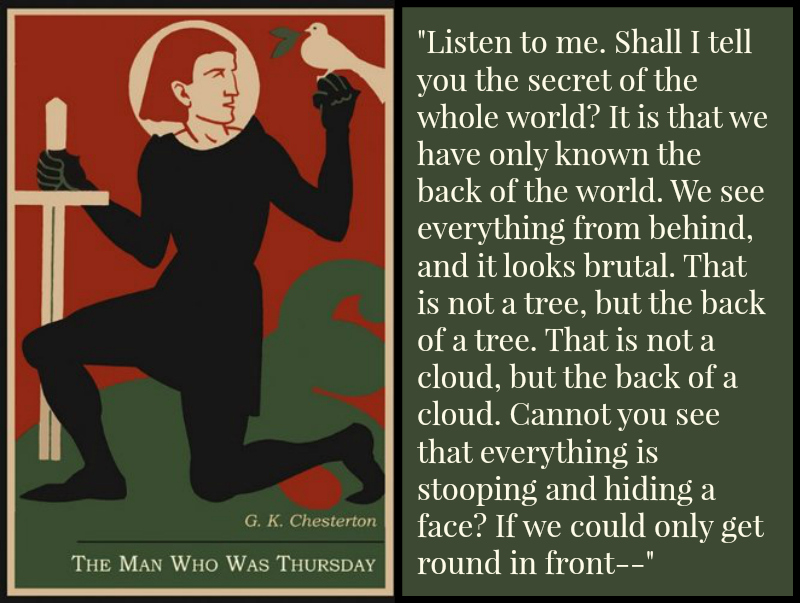
I have not read much of G. K. Chesterton in the past, but I have read and loved quote after quote after quote of his. In fact, I think he may be one of the most quotable writers ever. He has a way of taking profound thoughts and turning them into clear, short, brilliant, and often witty or playful statements. In many ways he greatly, in all the best ways, reminds me of C. S. Lewis.
I have his book of essays, and have delighted over several of them, but this is the first book of his I’ve read, fiction or non-fiction. This story happens to be the best of fiction in that points to Truth in a way that non-fiction cannot. I knew nothing going into it, and I think that’s the best way to experience it. Therefore, I intend to tell you nothing about it. [grin] Other than, of course, that I found it brilliant, thought-provoking, and witty in an inimitable Chesterton style. And, of course, I must share a few quotes that struck me but, I hope, do not give away the plot of the story.
The Man Who Was Thursday: A Nightmare
"What is poetical about being in revolt? You might as well say that it is poetical to be sea-sick. Being sick is a revolt. Both being sick and being rebellious may be the wholesome thing on certain desperate occasions; but I'm hanged if I can see why they are poetical. Revolt in the abstract is--revolting. It's mere vomiting.
"It is things going right that is poetical! Our digestions, for instance, going sacredly and silently right, that is the foundation of all poetry. Yes, the most poetical thing, more poetical than the flowers, more poetical that the stars--the most poetical thing in the world is not being sick.""Through all this ordeal his root horror had been isolation, and there are no words to express the abyss between isolation and having one ally. It may be conceded to the mathematicians that four is twice two. But two is not twice one; two is two thousand times one. That is why, in spite of a hundred disadvantages, the world will always return to monogamy."
"The fear of the Professor had been the fear of the tyrannic accident of nightmare, and...the fear of the Doctor had been the fear of the airless vacuum of science. The first was the old fear that any miracle might happen, the second the more hopeless modern fear that no miracle can ever happen."

I read this five years ago on my own (as opposed to in a book/discussion group). Felt as lost reading it as I felt when I first read Alice in Wonderland. It's probably a book I'll return to again one day, and be more diligent about finding helpful commentary. Today has been spent hunting down various internet wisdom regarding Flannery O'Connor's Wise Blood, that I just finished this morning. Super weirdo book to read thru, in which I would have moments of aha!-insight, just to get lost again. Essays have helped me oodles to plumb the depths... :-p
ReplyDeleteI'm with Skeller...I read this and thought "I could define each consecutive word and I could tell you the basic plot but some how I feel I've missed the point" this was how I felt reading The Magician's Newphew and the Horse and His Boy as a child. I feel like I need a primer in philosophy and world views...maybe it would make more sense after I finish Total Truth by Nancy Pearcy?
ReplyDelete